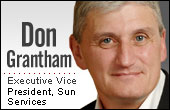People problems at Sun


Don Grantham's conclusion comes from his division's experience conducting risk assessments for customers as part of its Sun Preventive Services (SPS) programme launched last year. The offering proactively monitors datacenters and warns administrators of pending problems.
"We do risk assessments in three areas -- on systems, on processes and on people," the executive said in an interview with ZDNet Australia. When asked what area was consistently the worst, he responded without hesitation: "Ironically, it's the people."
"And that's not because anyone's got bad people. It just emphasises the need for training -- ongoing training, and ongoing skills management."
The people problem is one reason why Grantham's vision for the future of vendor support is a little stark: he calls it "machines monitoring machines", a world where automation will take a lot of the support burden off human engineers, and even prevent problems before they come up.
The reality of such a vision coming to pass can be seen though the change occurring within Grantham's division, particularly in the way Sun is building on its November 2004 acquisition of US company SevenSpace, a specialist in remote management.
With SevenSpace came a datacentre based in Virginia, from which Sun is now managing more than 100 enterprise customers remotely. The vendor is currently building a similar centre in Scotland, and is discussing a third to be located in the Asia-Pacific region.
With the new datacentres, Sun plans to start offering more of its customers support services based on the proactive monitoring model embodied by SPS rather than the so-called 'break-fix' support model which sees Sun get a call each time one of its products has a problem.
"The model that we want to move to, is to monitor the systems, initially through the SevenSpace model," said Grantham.
"The whole thrust of the strategy ... is that we're going to offer value through technology and process, not through people and process," the executive further explained.
"We start to monitor and support and give the customer more uptime, much less unplanned downtime, but we don't do that by flying in people who are going to sit on site, because that's a fixed-cost model."
Grantham said customers had responded positively to SPS, which launched approximately a year ago, and has had 40 customers beta-testing it since then.
Due to this more proactive approach, he believed Sun's support centres would stop receiving as many calls from customers, but would start making more calls in return.
"We want our resources to start acting in a proactive way in supporting our customer base, supporting and using technology and systems to do it, rather than the same people today reacting to a call that comes in," he said.
Such an approach could result in customers receiving calls from Sun to the tune of "we think you're about to crash so you better stop doing that," or "we believe that in two weeks' time you should take this machine down for some planned downtime because we need to carry out this maintenance".
"The business model is interesting to our customers in the sense that we offer the equivalent of a good driver discount," said Grantham.
"If you get your car insured for the first year and you don't have any accidents, you get 20 percent good driver discount."
Sun will provide a similar model of savings to customers, after it has signed them up for a service level agreement (SLA) on their IT shop based on an audit conducted by Sun.
"It's a totally new concept," said Grantham.
And it's a concept which appears to be garnering early wins for the executive's division. Grantham said SPS is part of the reason why revenue coming from his division's professional services product line grew 9.9 percent last year, as opposed to the basic break-fix business, which grew at a much slower 1.2-1.3 percent.
But ultimately people are always going to be necessary in any support business, Grantham acknowledged.
"For as long as you build things, whether it be automobiles or computers, when they fail, even if you monitor the fact that they're failing and are going to take them down in a planned session, you've still got to go out and fix them," he said.
"Machines aren't going to go out and fix them. You need people to go in -- you know what I mean?"